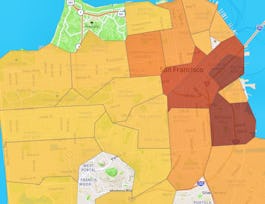In collaboration with the Rollins School of Public Health and the CDC's Division of Global Health Protection, Emergency Response, and Recovery Branch, this course introduces basic concepts and principles of communicating during a global crisis or emergency. It explores why communication during an emergency is different and the importance of adapting emergency messages to the needs of affected populations. Through sample scenarios, you will get the opportunity to identify information needs and develop useful messages using six guiding principles to help you communicate effectively and promote behaviors that reduce health risks during an emergency.


Communicating During Global Emergencies
Taught in English
Some content may not be translated
18,990 already enrolled
(357 reviews)
Details to know

Add to your LinkedIn profile
3 quizzes
See how employees at top companies are mastering in-demand skills


Earn a career certificate
Add this credential to your LinkedIn profile, resume, or CV
Share it on social media and in your performance review

There are 3 modules in this course
During this week, we'll explore the framework of CERC, the primary function of risk communications, and consider common principles to follow when communicating to affected communities during a crisis.
What's included
5 videos5 readings1 quiz1 peer review
In this week, we'll consider the focus of communication during emergency response as well as the creation and application of a crisis communication plan.
What's included
5 videos2 readings1 quiz1 peer review
During our final week, we'll explore the International Health Regulations' four components of risk communication through a fictional scenario.
What's included
6 videos5 readings1 quiz1 peer review
Instructors

Offered by
Recommended if you're interested in Public Health

University of Illinois at Urbana-Champaign

University of Michigan

Parsons School of Design, The New School

National Taiwan University
Why people choose Coursera for their career




Learner reviews
Showing 3 of 357
357 reviews
- 5 stars
79.05%
- 4 stars
15.08%
- 3 stars
2.51%
- 2 stars
1.11%
- 1 star
2.23%
New to Public Health? Start here.

Open new doors with Coursera Plus
Unlimited access to 7,000+ world-class courses, hands-on projects, and job-ready certificate programs - all included in your subscription
Advance your career with an online degree
Earn a degree from world-class universities - 100% online
Join over 3,400 global companies that choose Coursera for Business
Upskill your employees to excel in the digital economy
Frequently asked questions
Access to lectures and assignments depends on your type of enrollment. If you take a course in audit mode, you will be able to see most course materials for free. To access graded assignments and to earn a Certificate, you will need to purchase the Certificate experience, during or after your audit. If you don't see the audit option:
The course may not offer an audit option. You can try a Free Trial instead, or apply for Financial Aid.
The course may offer 'Full Course, No Certificate' instead. This option lets you see all course materials, submit required assessments, and get a final grade. This also means that you will not be able to purchase a Certificate experience.
When you purchase a Certificate you get access to all course materials, including graded assignments. Upon completing the course, your electronic Certificate will be added to your Accomplishments page - from there, you can print your Certificate or add it to your LinkedIn profile. If you only want to read and view the course content, you can audit the course for free.
You will be eligible for a full refund until two weeks after your payment date, or (for courses that have just launched) until two weeks after the first session of the course begins, whichever is later. You cannot receive a refund once you’ve earned a Course Certificate, even if you complete the course within the two-week refund period. See our full refund policy.



